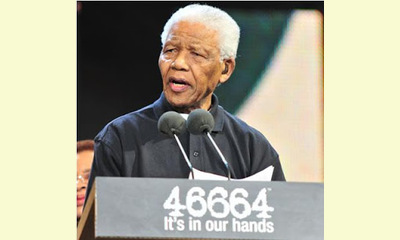|
|
Mandela is the new Africa
un article par Carlos Lopes, Executive Secretary of the Economic Commission for Africa
In every century there are a few names and events
that mark history. When I attended the first
public speech by Nelson Mandela after he was
released from prison I could not have imagined
that this man was going to be the absolute
rallying personality of the century. The reason
why, in that square in front of Cape Town City
Council, I could not have thought so, was not
because I doubted one inch how special and unique
Mandela was, rather, it was because I doubted an
African could be recognised the world over. After
all, he had spent 27 years in prison and did not
create during that period, the commotion that
followed.

click on photo to enlarge
While in prison, mainstream media should have
crowned him ‘Personality of the Year’ many times
over, but that never happened.
While the Mandela that was liberated remained the
same man at his core, he had surprises to reveal
that nobody could have imagined.
Mandela had time to prepare for what he believed
was inevitable: the end of the most outrageous
institution of the century; and the official
coexistence of a regime proclaiming racial
separation with an international community that
had approved a Universal Declaration of Human
Rights. This paradox was only one of many that
created a platform for Nelson Mandela to
demonstrate that he was different. He espoused
complexity. He was no common hero. He emerged as
the epitome of human dignity.
Mandela was one of the last African leaders who
dedicated their lives to the fight for the
liberation of the continent from the shackles of
colonialism. He is counted among the men and
women who lived, fought and died for the principle
that Africa could manage its own affairs. Kwame
Nkrumah, Julius Nyerere, Amilcar Cabral, Patrice
Lumumba, Oliver Thambo, Nelson Mandela and many
others fought the intellectual, political, social,
cultural, and, sometimes, the military battles
that now enable Africans to live a life they can
claim to better control.
The various stages of the life of this great man
offer us many lessons and points of reflection.
As Africa turns the century, and as we look into
developing a new vision for the continent by 2063,
we must take inspiration from his “long walk to
freedom”.
As a leader, Mandela was father to all, and led
his people through a period of truth and
reconciliation. He personified passion, inspired
us with his actions, and taught by example. He had
a strong sense of character and stood by his
convictions even when it was dangerous to do so.
Mandela has been a great inspiration to me and my
generation. He embodied the unification and
integration of the continent. The struggle for the
total liberation of Africa did not end when
Mandela was released from prison as he said in
that speech in Cape Town.
I would like to add humbly that it cannot end with
his death either, especially now as we develop the
narrative for an African renaissance. Mandela’s
legacy, values and truths will act as a strong
foundation for a united and prosperous Africa.
|








|
DISCUSSION
Question(s) liée(s) à cet article:
What is the legacy of Nelson Mandela for us today?,
* * * * *
Commentaire le plus récent:
ON MANDELA'S LASTING LEGACY
In death, as in his life, Nelson Mandela has captured the imagination of the world. Mourning mixed with celebration has electrified crowds all over South Africa and elsewhere. His life’s achievements and his lasting legacy are the topics of discussions. He has been described as a great warrior, a great liberator, the last giant in the fight against colonialism, forgiver, peace maker, and in many other ways.
All this week, Mandela’s lasting legacy has been on my mind. We tend to capture the legacies of great men and women in a word or two. A scientist becomes famous for an important discovery, a writer for a famous book, a musician for a great composition, and so on.
People like Mandela fall in a different category. He is in the category of Mahatma Gandhi and Dr. Martin Luther King. . ... continuation.

|
|









